Django Django on the dance music-inspired Off Planet: "I started making music in the ’90s with an E-mu sampler, so part of my brain is still stuck there"
Django Django’s retro house-influenced new project is a flurry of hypersonic colours and energy. We spoke to the band’s cofounder David Maclean about the record’s inspirations, tech and evolution
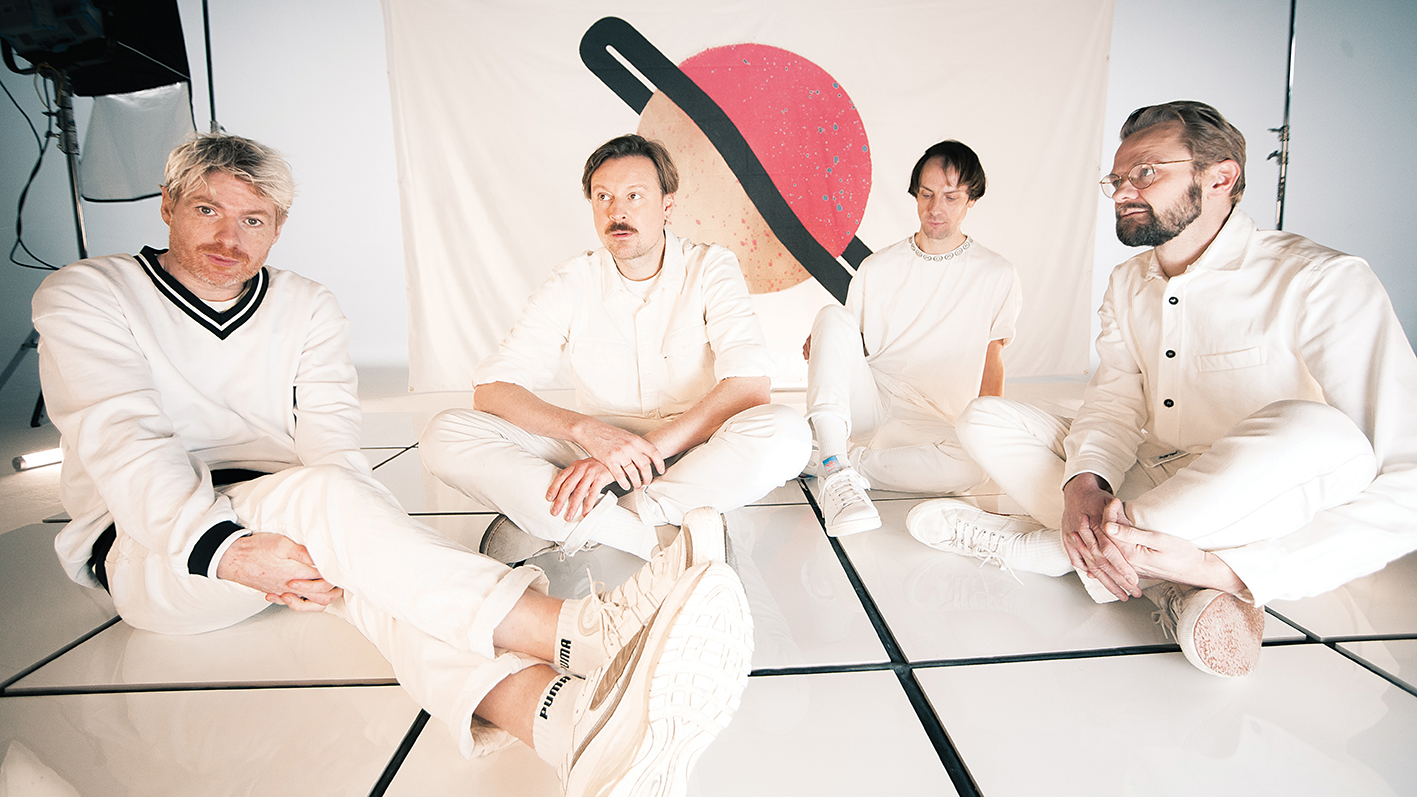
Few artists have the deft ability to genre-hop without alienating vast swathes of their audience, but for Django Django, and the four-part Off Planet expanding their sound palette to channel the vibe of their formative dance music influences, as well as introduce an array of guest lead vocalists, has yielded a galaxy-sized bounty.
Take the Self Esteem-fronted Complete Me, a pulsing slice of early ’90s rave-pop, led by one of the UK’s most in-demand vocalists. Then there’s the Jack Peñate-centred No Time, a joyous slice of euphoria, pre-soundtracking the baking summer we’re set to have this year. Cuts that sound a world away from Django Django’s earlier work, yet share an exploratory through-line with them.
Founded in 2009, the stuttering indie-rock oddity Default launched the four-piece as an unconventional addition to the UK’s indie canon. Subsequent records found the troupe investing in more ’80s synth-pop influences (Marble Skies) and sci-fi tinged psych-rock (Glowing in the Dark). Now Django’s core creative instigator – former house DJ and beat-crafter David Maclean – felt it was time to gear-shift into a dimension not a million light-years from the dance music culture that he spent much of his youth living.
We asked David how the record found its shape: “The starting point for this album actually goes back a long way. A lot of this music and the beats and stuff were kind of on old hard drives. I’ve been making music since the 1990s and there’s bits and bobs from that era that were still floating around. During lockdown, I was forced to go back to old ideas. The timeline is a bit all over the place, but I guess it was lockdown that forced me to spend a long time thinking about it, that was the starting point.”
We made the first self-titled album not really knowing what the hell we were doing
Forming the band with a group of co-students at the Edinburgh College of Art – Vincent Neff, Jimmy Dixon and Tommy Grace – Maclean has been at the forefront of the band’s questing sonics. With Off Planet, David explains that the journey to this point has been a roadmap-free ride: “We’d made the first self‑titled album which was, like, a bit of a fluke, we made it not really knowing what the hell we were doing. We just made it.
“Then the second, third and fourth albums represented us striving to make albums that had all the right flow and the right textures and stuff. We really put a lot of time into how they sounded as albums. That dictated a lot of the tracks that went on there.”
Despite this refined focus, David wanted the band be an even freer creative vehicle, “I want to make the tracks I want to make without worrying where they fit on albums, or if they ‘sound’ like Django Django. A lot of the stuff that I make on my own is far more electronic-based and really not so focused on songwriting. [Making this album] we spent less time worrying about what people want from us and sort of doing what we wanted to do a bit more.”
Get the MusicRadar Newsletter
Want all the hottest music and gear news, reviews, deals, features and more, direct to your inbox? Sign up here.
Call on me
Off Planet welcomes a host of guest lead vocalists to the Django Django universe, in a move inspired by the acts that David loved when he was younger: “I’ve always really loved the whole ‘features’ thing, it was a big part of hip-hop and artists like Massive Attack. It’s just a way of switching up things.
“But if Jim and Vinny and I can’t crack the nut of the topline, we kind of think it’s ok to sort of get other people in to help. That was the idea behind that. A lot of them were tracks we had sitting around that nobody knew how to approach. Then we got someone in and straight away they knew how to topline it. That was a big help.”

Among the guest vocalists, was Rebecca Lucy Taylor (aka Self Esteem) who has worked with the band before. “I produced Rebecca’s first EP and released it on a little label I was running at the time. We’d met at SXSW and then in London years ago. I remember talking about doing a more dancehall, R&B thing then when she was still in (her first band) Slow Club.
“We finally got round to doing stuff, and we kept in touch. I’d made that beat, not really knowing why or what it was for. Suddenly I could just imagine her on the track (Complete Me) I sent it to her and very quickly she just sent back the topline. She just got the whole vibe.”
The guest appearance of Jack Peñate on the blinding No Time features an incredibly succulent lead vocal, routed through a Soundtoys-leaning chain. “It was put through Soundtoys EchoBoy and Decapitator and just a whole heap of stuff in that chain. Again, I just went to one I’d previously saved. He wanted quite a raw sound, I’d had this one which was a bit OTT. I was a bit worried it was too much but he wanted it, he liked it. I think it was right. The track is quite influenced by Roy Davis Jr.”
The computer music revelation
Though Django Django is a democratic outfit, Dave had no qualms about incorporating more retro-angled sonics into his demos, without being too prescriptive about the direction he wanted to take the new record.
“I never chase the sound. I get in the studio and get some loops going, then some samples and then it just comes out the way it comes out. I never really sit down and think ‘I’m going to make something like this’. A lot of them sound a bit ’90s, but then again I started making music in the ’90s so it’s not as if I was not around then or I’m being nostalgic – I was working with samplers and making music then so part of my brain is still stuck there, I guess.”
The first thing I had was an E-MU sampler. That was my whole way of making music for years, before the era of the computer screen
We wonder if David uses some of that very same classic gear when building ideas today, and how balanced the current studio balance of hardware and software is. “The first thing I had was an E-MU sampler that I got at Turnkey in London. I just used to hook that up to a MIDI keyboard and a four-track; my friend had an eight-track actually and he’d bring that round. We’d share it. That was my whole way of making music for years, before the era of the computer screen.
“I remember Tommy and I had a flat in 2001 and he hooked up the first version of Cubase on an Atari. I saw that and remember saying ‘this could change things quite a bit’, seeing the waveform and things like that. I’d had an Amiga with some similar stuff, but I couldn’t get my head round it.”
Following this computer music revelation, Maclean got himself a PC. “I first got Cubase 3 or something, and then for years, right up until around four years ago, I was only on Cubase 5. Even today I’m only using v8. I’m always way behind on software. But, it works for me. The way I use it is still in four-track mode. I treat everything very rudimental, and more as a tool.”
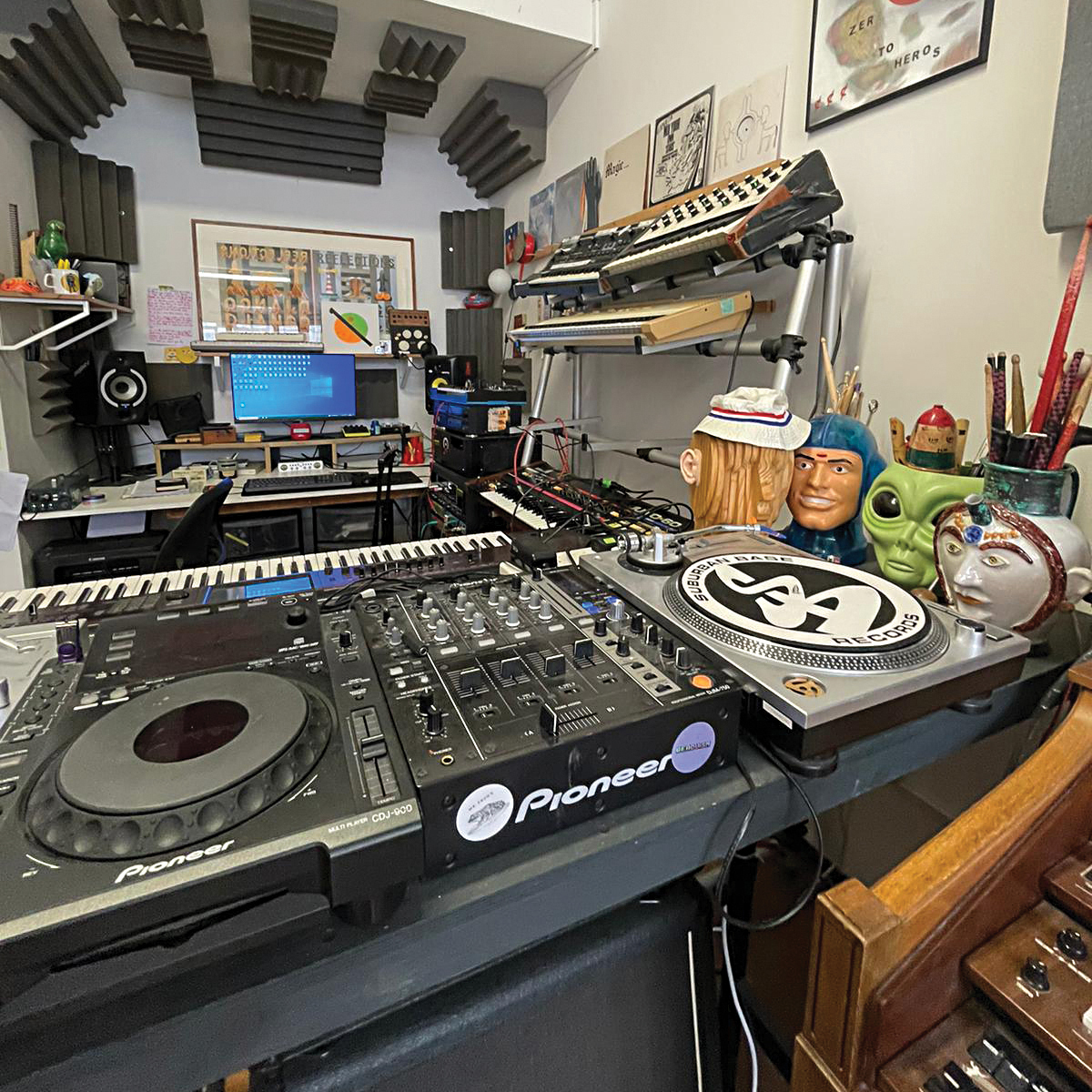
Nevertheless, David’s plugin arsenal is fairly vast. “I love Waves and Soundtoys stuff. For the first album I was using FL Studio quite a bit, in conjunction with Cubase. For me, if it sounds good, it sounds good. On the first album we got asked a lot about the process, and people were surprised by how DIY the making of it was, creating most of the samples ourselves. Now everyone is doing that. Hitting things and recording it.”
Despite having a rack of retro synths, Maclean incorporated NI’s Massive and Kontakt into proceedings. David’s sampling ethos merges the two worlds, with vinyl-based sample-building routed straight into Cubase. “I have piles and piles of records with stickers on them, that say where on the record the best elements to sample are.
“I can just go to the record, find the right break (it might just be a kick or a snare, or a bongo loop or something) and that’ll be the starting point for the day. That could become the backbone of an entirely new track. I’m sampling straight into Cubase, my decks are hooked up to my computer. Sometimes if I’m stuck I’ll head somewhere like Splice, if I need a polyrhythm for it, I’ll pull some things out that I don’t even demo, just to try and get some happy accidents going.”
David never lets a drum machine do the heavy lifting, instead concocting beats via his curated array of one-shots. “I never program a drum machine to do anything, I like to break it down and have sort of one-shot elements from it and construct my own rhythm from it. I guess we have a weird way of working compared to some.”
Getting in the Galaxy Mood
While there’s some extraordinary sonics in play across Off Planet there’s also some rather kitsch‑sounding elements that evoke the pre‑computer age. Namely, the cheesy laser‑gun synth sounds that can be found on the extraordinary Galaxy Mood. “That’s a Korg Kronos,” David explains.
“I don’t know what it is but it’s almost like an acid line, like a 303. That was just me jamming – I wasn’t even trying to make music. The beat in the background is a range of disco loops that I pulled out from my sample library, there’s a little bird tweeting that is actually taken from the start of an old electro record.”
He elaborates further on the track’s construction: “I’ve got a thing on my DJ mixer that loops on the bleep, so I just layered up loops on that in real-time, I had that running live and then I plugged in the Kronos, typed in the BPM and programmed an arpeggio. I was flicking through sounds and bending the processor knob thing.
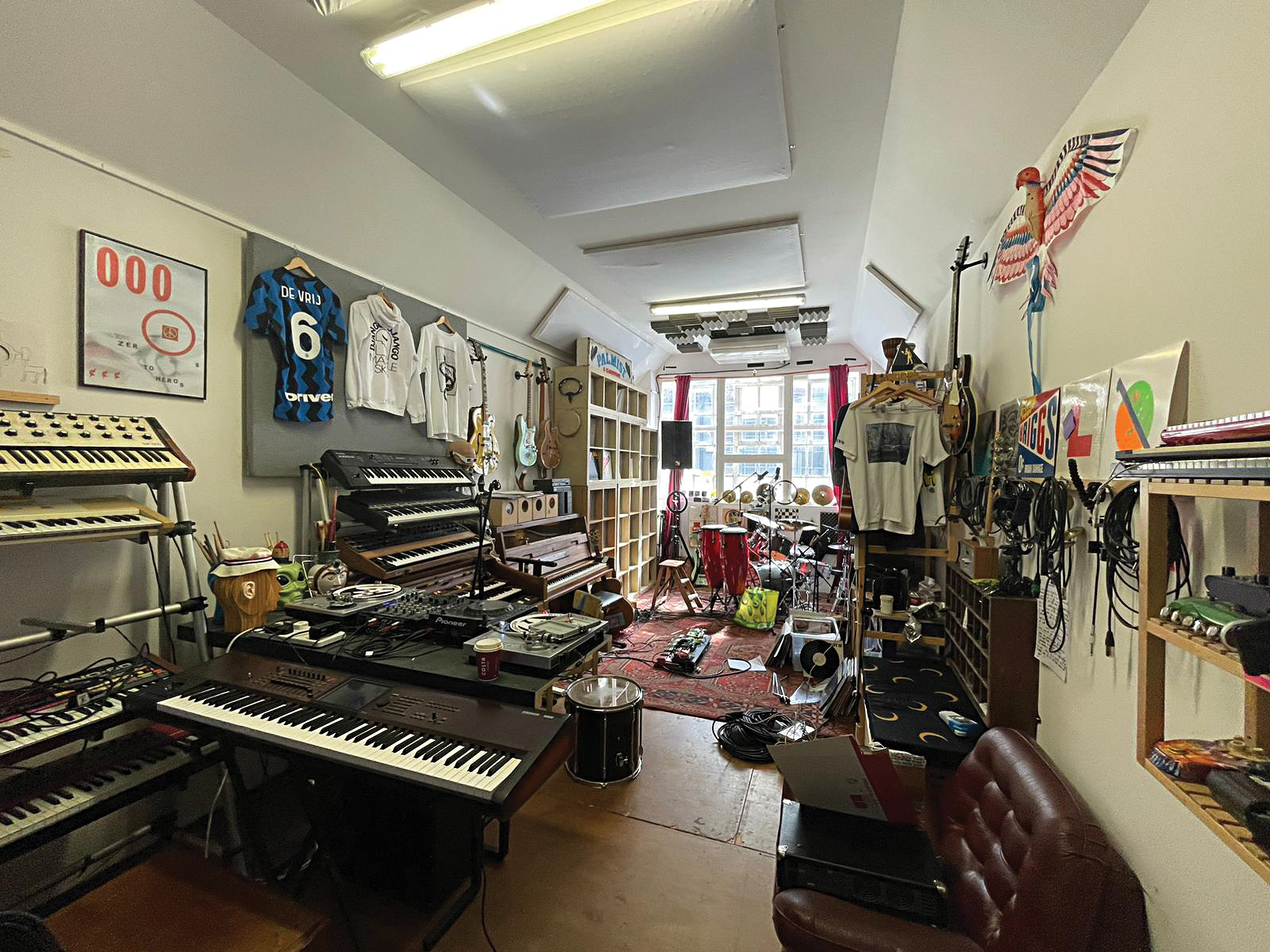
“I was literally mucking around, but I caught a 10-second loop of me doing that and that would become the track. It was an accident that I’d never be able to go back and re-do the same way. It’s quite bombastic that sound, you can’t do anything else. The acid bass line was so heavy, all it needed was that and a drum. It just stayed like that.”
While the retro-synth tone is a major component, there’s also a touch of supporting guitars, taking more of a backseat on this record than before. Maclean explains that upon reading an interview with Tame Impala, the band began using Native Instruments’ Guitar Rig. “It’s really cool just being able to sift through tones and effects. On the first album we didn’t really have stuff to work with as good as this, the software wasn’t quite strong enough. But now it’s great.
“We use a mixture of live amps mic’d up and Guitar Rig. With mic’ing guitars up, engineers would be horrified at how we do it. We’ll look on YouTube and check out the best ways to do things, but there’s always something wrong, like a big buzz in the background. I guess I get quite annoyed in music production when there’s too many options and infinite possibilities.”
Chop chop
We ask David at what point the band decided to release the resulting record in four parts; and why? “Again, it was just not wanting to be constrained by a traditional album. Inevitably when you make an album, people will say ‘don’t make it more than 45 minutes, don’t make it longer than 13 tracks’. I always wanted to do a double album. But the label resisted. I suggested we break it into four chunks and the label was more on-board.”
Though initially the ideas for the record were pretty avant garde, eventually they settled into a more accessible format. “Originally they had no real structure, just weird loops and things like that. People would have probably hated it,” David tells us.

“Inevitably they just got polished up and developed into more songs. The label realised there were a few radio singles in there. So it all worked itself out. We talked about all different things, releasing under a different name or putting them out and not telling anyone. It was just a kick against album cycles and being stuck making a record and touring it again.”
With that evolution in mind, Maclean explains that most of the 21 tracks on the record shifted quite dramatically from their initial more free-flowing forms; “No Time started out as an instrumental deep-house thing. It was just an organ and drums, then suddenly it became this sort of pop track with an uplifting chorus. As soon as (guest-vocalist) Refound started rapping on Hands High that went from being a sort of Serge Gainsbourg-type thing to a very different vibe.
“It’s not really got a hip-hop backing track. For a lot of the tracks the starting point for was just so wayward. Case in point, the track Black Cadillac was much more of a dubby thing, almost like a sort of heavy dubstep thing. Then a kind of Link Wray-esque guitar line was introduced and that completely changed the whole song.”
No turning back
David explains to us that while he spends a lot of time in his garden-based office/studio, the main Django Django workspace in Tottenham is the band’s primary Aladdin’s cave of keyboards, pianos, synths, guitars and the group’s main computer. “I was switching between the two. When the record got to a certain level of ‘done’ I’d be in the Tottenham studio most days.” Dave admits that with this record, a gear-shift has happened in Django Django’s mindset, meaning that the group will never return to the same sound that they’d previously explored on albums one to four.
“We won’t go back and make something that sounds like the first four albums again, or probably even this. The way we work, even track-to-track, is that if we make a sort of bombastic dance thing like Galaxy Mood, then the next track we mix is a kick against it. The next album will probably be very different from what I would say.”
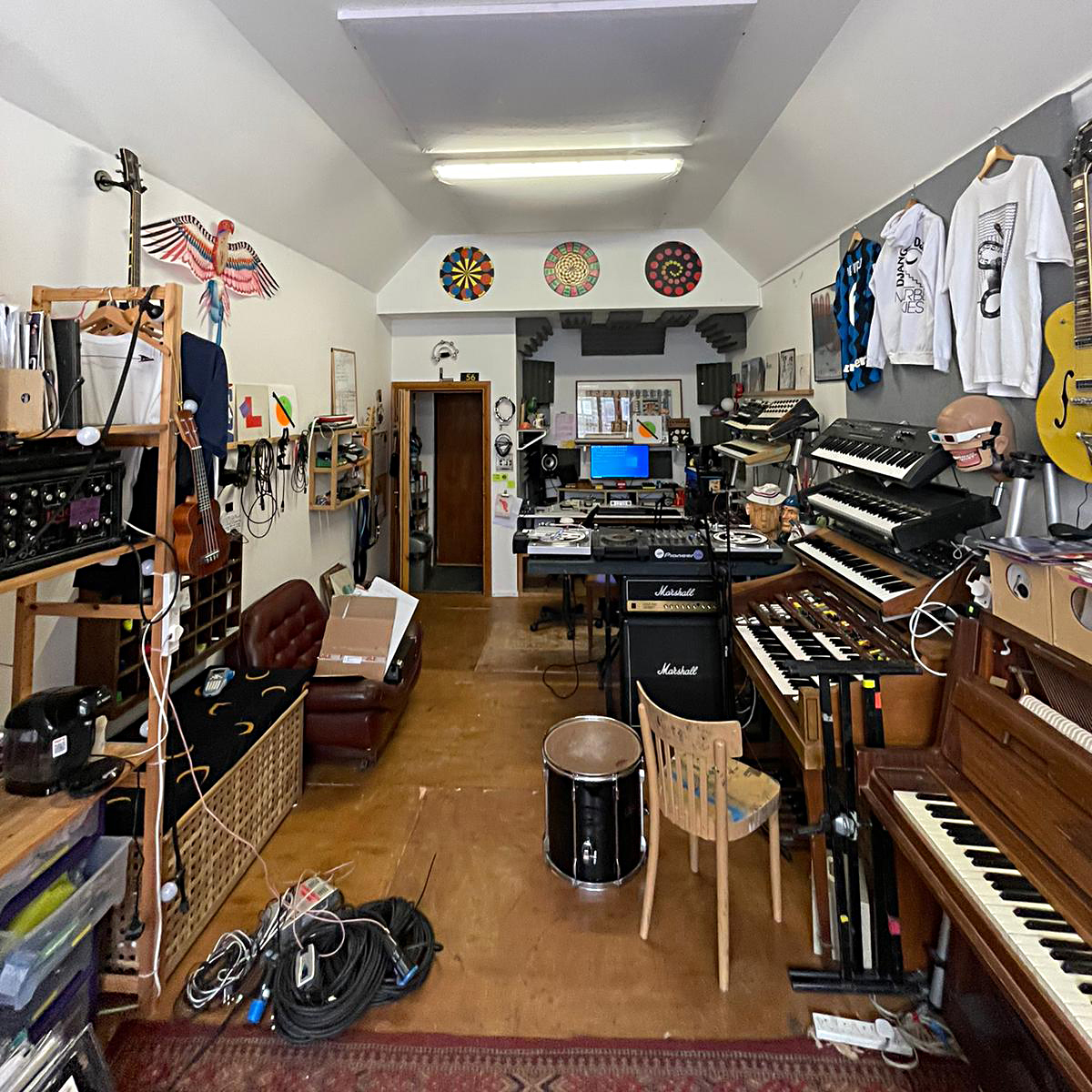
“That’s the thing with Django, nothing is off the table,” David says. “While we might sort of veer into genre stuff, we don’t want to make a genre album that tries to emulate a genre’s tropes, we’re still able to turn our attention to anything really.” Pushing Dave a little further reveals a few more details of Django’s future movements.
“I don’t want to give too much away, but we are talking about doing something quite different and more soundtrack-focused. Something with a bit of a narrative flow. So, yeah, I think we’ve liked this idea that we can kind of break out of a normal album now and try different things.”
Escape velocity
As Dave and his bandmates gear up for a summer of live dates and festivals, our conversation turns to how he’d encourage readers of this magazine – and anyone trying to make headway in the modern music industry – to develop.
“Well, it’s so different from when we started, but I’d say just try and keep doing it.” Dave implores, “Inevitably it leads to the question of money and whether you want to do it professionally. There’s more possibilities now – loads of people make music and just have it live on Instagram and TikTok and don’t actually make albums. Then there’s DJs who just make tracks to play in their set and skip the rigmarole of press releases.
“Music is more instantaneous now. You can make something in the morning and by the night time you’re playing it out in a club and everyone wants to know what it is. There’s a million different ways to get your music out there now and the strongest advice I have is just to do it. [Don’t] give up on it – just keep hammering away at it.”
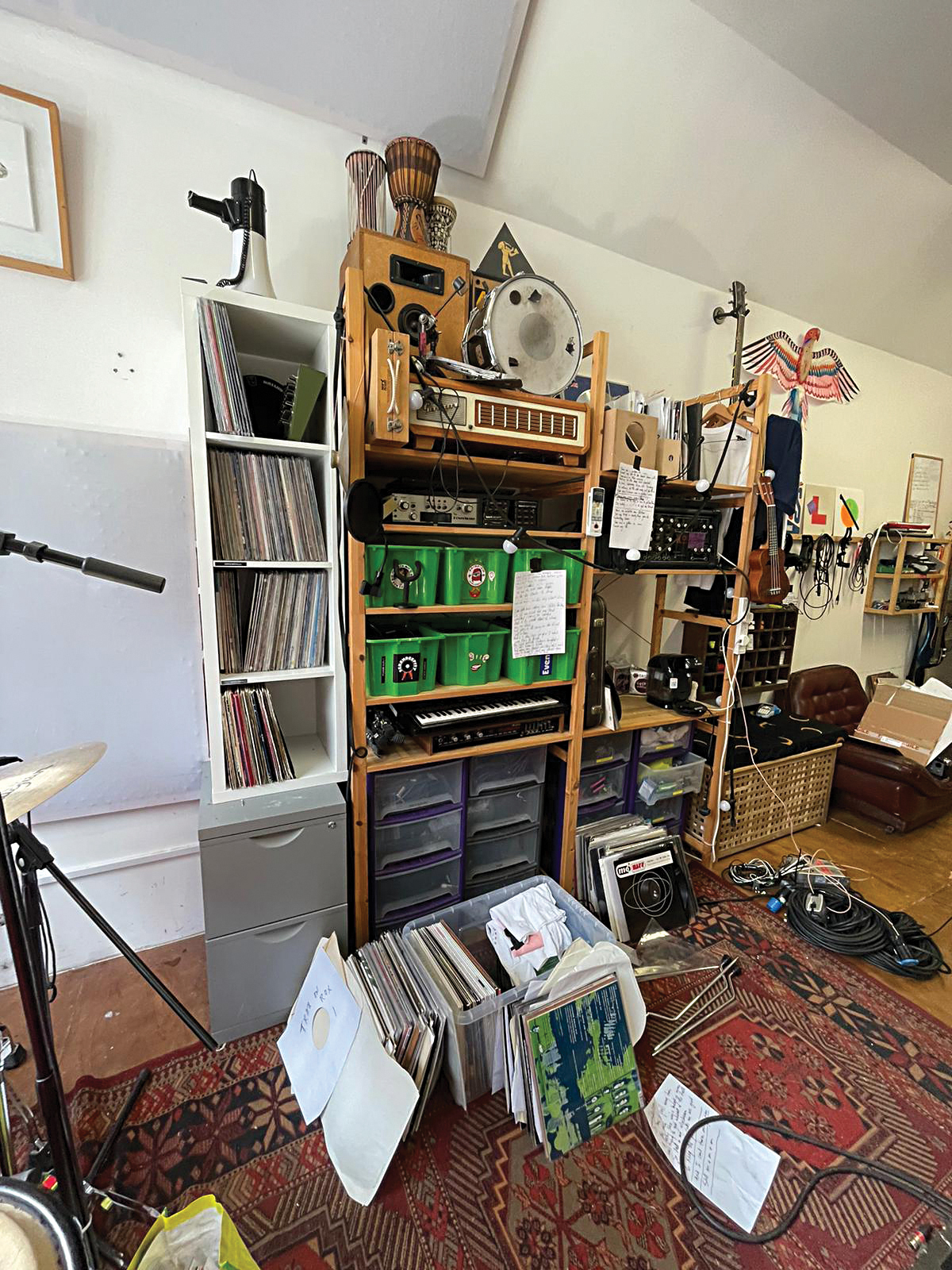
Dave’s certainly very cautious of the impact that AI will have on the industry. “Everything is about to change again because of AI. I don’t think anybody has really realised yet; it’s not really hit them what’s about to happen, these things like AI and streaming. But you have to keep up with the changes, you can’t get grumpy and kick against it, you have to think about how to use it to your advantage.”
While the band’s sound may have shifted several gears since the early days, the emphasis on quick-fire creativity remains a solid foundation: “We have quite a speedy way of working, so if anything is taking too long or is too fiddly it’s out. I could never get into patching up modular synths and Eurorack things because it’s a huge time-sink. I’m not into spending ages trying to find a sound. I’m very immediate. If I can’t get it quickly I forget it and move on.”
For Django Django, Off Planet is both an explosion of summer-playlist-bound bangers, and a statement of boundless intent.
Django Django's Off Planet is out now. Head to the band's website for more info on upcoming tour dates.



I'm the Music-Making Editor of MusicRadar, and I am keen to explore the stories that affect all music-makers - whether they're just starting or are at an advanced level. I write, commission and edit content around the wider world of music creation, as well as penning deep-dives into the essentials of production, genre and theory. As the former editor of Computer Music, I aim to bring the same knowledge and experience that underpinned that magazine to the editorial I write, but I'm very eager to engage with new and emerging writers to cover the topics that resonate with them. My career has included editing MusicTech magazine and website, consulting on SEO/editorial practice and writing about music-making and listening for titles such as NME, Classic Pop, Audio Media International, Guitar.com and Uncut. When I'm not writing about music, I'm making it. I release tracks under the name ALP.
“I called out to Mutt and said, ‘How about this?’... It was a complete fluke": How Def Leppard created a rock anthem - with a little bit of divine intervention
"It was ugly, like watching a divorce between four people. After a while, I had to get out": Beatles engineer Geoff Emerick on the recording of Abbey Road, track-by-track









